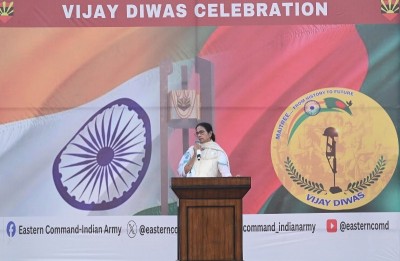 Kiren Rijiju
Kiren Rijiju
'It is govt's right to appoint judges': Law Minister Kiren Rijiju's message for Supreme Court
New Delhi/IBNS: Amid a row over the judges' appointment with Supreme Court, Union Law Minister Kiren Rijiju Thursday once again flagged concerns over the government's "limited role" and stressed that the same is not in sync with the spirit of the Constitution.
He delivered the latest message for the Supreme Court at the parliament.
"The government took many steps to reduce the pendency of cases, but the government has a very limited role in filling vacancies of judges. The collegium chooses names, and apart from that, the government has no right to appoint judges," Rijiju said.
He said the government had often conveyed to the Chief Justice of India and High Court Chief Justices to "send names (of judges) that reflect the quality and India's diversity and give proper representation to women".
"I don't want to say much as it may seem like the government interfering in the judiciary. But the spirit of the Constitution says it is the government's right to appoint judges. It changed after 1993," he said.
Rijiju also referred to the National Judicial Appointments Commission (NJAC) Act, enacted in 2014 to give the government a role in judges' appointments, which was scrapped by the Supreme Court in 2015.
"Unless the procedure of appointment of judges changes, the issue of high judicial vacancies will keep cropping up," said the Law Minister.
Rijiju has raised this point repeatedly over the past few weeks, claiming that the collegium is not what the people of India want.
In 2014, the BJP-led government tried to change the system with the National Judicial Appointments Commission (NJAC), which would have assigned a major role to the government in judicial appointments. But the Supreme Court rejected the law months later.
Earlier this month, after Rijiju raised the subject at an event, the Supreme Court warned against "derailing the collegium system"
The Supreme Court Collegium on Tuesday recommended the names of five High Court judges for elevation after the government rejected the list last month.
The fresh list includes judges from Bihar, Rajasthan, Manipur and Uttar Pradesh.
The decision was made at a marathon meeting on Tuesday, shortly after Justice Dipankar Datta took the oath of office at the apex court.
The recommendation comes in the backdrop of a larger issue of judges' appointment, in which the Centre wants a role.
The Supreme Court maintains that the Collegium system is the "law of the land" which should be "followed to the teeth".
Last month, the Centre did not approve the names of 19 judges recommended for elevation by the Collegium.
At a hearing on the issue last week, a bench of Justices Sanjay Kishan Kaul, Abhay S Oka, and Vikram Nath said it was unacceptable that the government will keep the Collegium's recommendations pending.
"A decision has to be taken within a reasonable time. Once a name is reiterated you (the government) are to appoint it. You are sending names back twice over, thrice over. This means you will not appoint a person which is contrary to the judgment. Till the Collegium system is there, you have to enforce it," Justice Kaul had said.
Support Our Journalism
We cannot do without you.. your contribution supports unbiased journalism
IBNS is not driven by any ism- not wokeism, not racism, not skewed secularism, not hyper right-wing or left liberal ideals, nor by any hardline religious beliefs or hyper nationalism. We want to serve you good old objective news, as they are. We do not judge or preach. We let people decide for themselves. We only try to present factual and well-sourced news.







